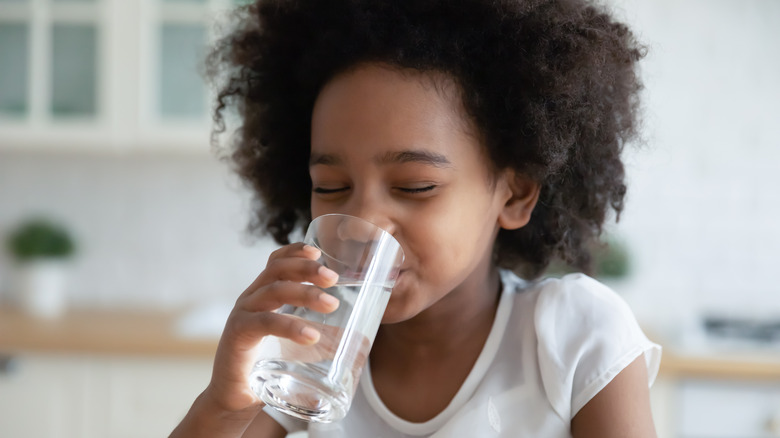Is Carbonated Water Healthy For Kids?
Many kids love sparkling water — and for good reason. This beverage is refreshing, easy on the stomach, and perfect for a hot summer day. Plus, it can be a healthy alternative to sugary drinks. "There is no evidence that carbonated or sparkling water is bad for us," said dietician Stephanie Dang in an interview with Global News. However, some brands may contain added sugar and fillers.
As the name suggests, this drink consists of water and carbon dioxide. Therefore, it's just as hydrating as still water, says Dang. The only difference is that it's slightly more acidic and contains bubbles. Regular water has a pH of 6.5 to 8.5, whereas sparkling water has a pH value of 3 to 4, notes MedicalNewsToday. Even so, plain carbonated water is unlikely to affect your bones or tooth enamel, explains Dang. Just make sure you avoid sugar-sweetened varieties, which may contribute to tooth decay, warns the American Dental Association (ADA).
Some types of carbonated water contain potassium, calcium, magnesium, and other nutrients, according to 2016 research published in Clinical Cases in Mineral and Bone Metabolism. These compounds support bone development, cardiovascular function, and hormone production, among other health benefits. For example, bicarbonate-rich mineral water aids in digestion and helps dilute stomach acid. Sulfate, a natural compound in mineral water, has mild laxative effects, whereas fluorurate keeps your bones strong. Despite these findings, there is still some concern about the impact of sparkling water on children's health.
Should children drink carbonated water?
Each year, American children consume more than 30 gallons of soda and other sugary drinks, according to the State of Childhood Obesity. These beverages have been linked to a higher risk of obesity, diabetes, heart disease, and cavities. Carbonated water may seem like a better option for kids, but is it really that healthy? The answer depends on who you ask. For example, a 2018 study published in the Korean Journal of Orthodontics found that sparkling water can erode tooth enamel. The ADA, on the other hand, says that carbonated water — except for citrus-flavored varieties — doesn't affect oral health.
Another concern is that phosphoric acid — a compound added to carbonated drinks — may negatively impact bone development in children. However, plain carbonated water doesn't contain this substance, registered dietitian nutritionist Anne Linge told the University of Washington. She also explains that drinking sparkling water won't cause tooth decay. Other beverages, such as soft drinks and citrus fruit juices, are far worse for your teeth because of their high acidity and sugar content.
Carbonated water may cause bloating and gas, but these issues are more likely to occur in people with digestive disorders. "As far as drinking still water versus sparkling water, the bottom line is that you can drink either," says Linge. Both beverages are equally hydrating and support good health. Again, it's important to read the nutrition label and choose a brand with no added sugar or artificial sweeteners.


